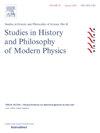In defense of a “single-world” interpretation of quantum mechanics
Q1 Arts and Humanities
Studies in History and Philosophy of Modern Physics
Pub Date : 2020-11-01
DOI:10.1016/j.shpsb.2018.03.002
引用次数: 25
Abstract
In a recent result, Frauchiger & Renner argue that if quantum theory accurately describes complex systems like observers who perform measurements, then “we are forced to give up the view that there is one single reality.” Following a review of the Frauchiger-Renner argument, I argue that quantum mechanics should be understood probabilistically, as a new sort of non-Boolean probability theory, rather than representationally, as a theory about the elementary constituents of the physical world and how these elements evolve dynamically over time. I show that this way of understanding quantum mechanics is not in conflict with a consistent “single-world” interpretation of the theory.
为量子力学的“单一世界”解释辩护
在最近的一项研究中,弗劳希格&雷纳认为,如果量子理论准确地描述了复杂的系统,比如执行测量的观察者,那么“我们被迫放弃存在单一现实的观点”。在回顾了弗劳希格-雷纳的论证之后,我认为量子力学应该从概率的角度来理解,作为一种新的非布尔概率理论,而不是从表征的角度来理解,作为一种关于物理世界的基本组成部分以及这些元素如何随时间动态演化的理论。我表明,这种理解量子力学的方式与理论的一致的“单一世界”解释并不冲突。
本文章由计算机程序翻译,如有差异,请以英文原文为准。
求助全文
约1分钟内获得全文
求助全文
来源期刊
自引率
0.00%
发文量
0
审稿时长
13.3 weeks
期刊介绍:
Studies in History and Philosophy of Modern Physics is devoted to all aspects of the history and philosophy of modern physics broadly understood, including physical aspects of astronomy, chemistry and other non-biological sciences. The primary focus is on physics from the mid/late-nineteenth century to the present, the period of emergence of the kind of theoretical physics that has come to dominate the exact sciences in the twentieth century. The journal is internationally oriented with contributions from a wide range of perspectives. In addition to purely historical or philosophical papers, the editors particularly encourage papers that combine these two disciplines.
The editors are also keen to publish papers of interest to physicists, as well as specialists in history and philosophy of physics.

 求助内容:
求助内容: 应助结果提醒方式:
应助结果提醒方式:


